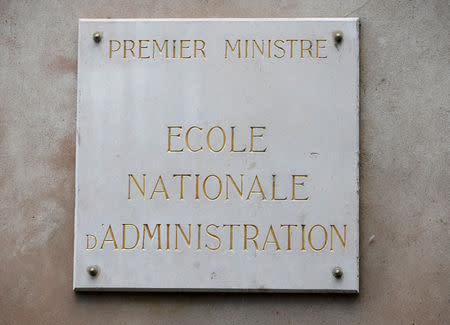France's Macron to shut elite ENA school in drive for fairness
By Richard Lough
PARIS (Reuters) - The Ecole Nationale d'Administration has for decades churned out presidents, ambassadors and industry leaders but on Thursday, President Emmanuel Macron said he would abolish what has become a symbol of inequality in his drive for a fairer society.
"To carry this reform we need to put an end to the ENA," Macron said as he outlined his response to months of protests in part against elitism in the political establishment.
"This is not about saying the ENA is a bad thing, quite the contrary. This is about ambitious reform, we need to build something that works better."
The president's eye-catching move against his own prestigious alma mater will please those who consider the ENA an emblem of the tight-knit club that dominates political and business circles and rile others who see a cynical gesture that fails to address the causes of France's social imbalances.
"If you keep the same structures, habits are too strong," Macron said as he sought to calm a five-month street revolt that has derailed his economic reforms and challenged his authority.
The postgraduate school was founded in 1945 by Charles de Gaulle to train a postwar administrative elite drawn from across all social classes. With time, however, it earned a reputation as out of touch and catering to privileged students from the upper social echelons and struggled to modernise its image.
Four modern-day presidents and seven prime ministers are Enarques, as the school's alumni are known. So too are the chief executives of telecoms group Orange, Societe Generale bank and the former boss of insurer AXA.
The flagbearer of Macron's European election campaign, Nathalie Loiseau, is a past director of the school and the president said France needed to change the way senior civil servants are recruited, trained and their careers are managed.
The growing tendency for Enarques to move back and forth between the public and private sector has only deepened the public perception of a distant, incestuous old boy's network.
ELITISM
"The ENA has come to symbolise exactly that which so many French people loathe: elitism," Alain Klarsfeld, a professor at the Toulouse Business School, wrote in a column in Le Monde.
Macron is not the first French leader to talk about either abolishing the ENA or narrowing the wide gulf between France's grandes ecoles like the ENA and its public universities.
With the education system already skewed, Nicolas Sarkozy tried to modernise the ENA by broadening the school's socio-economic in-take and sought to scrap the 'classement' system that allows each year's top 15 achievers to cherry pick the most prestigious posts. He failed.
"There are two types of Enarques: the top 15 and then the rest," said historian Marc-Olivier Baruch, who studied at the ENA nearly 40 years ago. "The top 15 know they will be the bosses of the rest, and the rest know they will obey the 15."
Shutting down the ENA is unlikely to solve France's two-tier education system, as students continue to pass through other grandes ecoles - highly competitive institutions that sit apart from the broader university system.
Asked how far abolishing the ENA would appease yellow vest protesters, Baruch said: "They won't give a damn."
Macron's plans for ENA leaked after a fire ripped through Notre-Dame de Paris cathedral, forcing the president to delay his long-awaited policy announcements and prompting a robust defence of the school from ENA director Patrick Gerard.
"No, ENA students are not cut off from the realities of their time," Gerard wrote in Le Figaro. "No, ENA students are not in their own little bubble."
(Additional reporting by Michel Rose, Writing by Richard Lough; Editing by Leigh Thomas, William Maclean)

 Yahoo News
Yahoo News 

